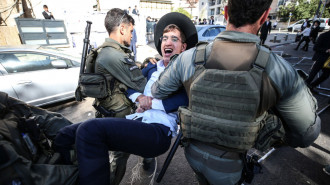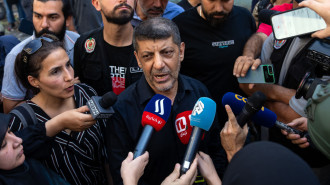Hundreds of Gaza-bound aid trucks pile up as Israel occupies Rafah border
Gaza's health system is under major strain as it runs short of vital supplies, including fuel and medicines, as Israel's month-long blockade of the Rafah crossing pushes the enclave further into a humanitarian crisis.
Hundreds of aid-filled lorries were sighted in Sinai over the past week, destined for Gaza but unable to cross through Rafah after Egypt refused to cooperate with the Israeli forces occupying the border area.
Independent Egyptian NGO the Sinai Foundation for Human Rights shared a video showing hundreds of lorries in rows parked off a highway near Al-Arish International Airport where tons of international aid for Gaza arrives.
It said it had been monitoring the accumulation of trucks in the vicinity of the airport, the coastal road, around the seaport and near Al-Arish city.
The Rafah border crossing, which serves as Gaza's only pedestrian exit point, was seized by Israeli forces on 7 May when they stormed the southern governorate following months of warnings.
The move angered Egypt, which saw it as a threat to the stability of the fragile northern Sinai region. Cairo has since refused to coordinate with the Israeli forces at the border.
The crossing point has since been closed, severely thwarting aid distribution in the war-ravaged territory and blocking some 2,500 critically ill patients from leaving to receive treatment.
Since 12 May no patients have been able to leave Gaza to receive treatment outside, according to NGO Medical Aid for Palestinians (MAP).
This includes hundreds of cancer patients, as well as those who have suffered injuries from the war.
Hospitals under strain
This week, one of Gaza's few functioning hospitals issued an urgent plea for help, after one of its two generators collapsed, putting hundreds of patients at risk.
حصلت مؤسسة سيناء اليوم الخميس 6 يونيو، على فيديو خاص يظهر تكدس مئات الشاحنات المحملة بالمساعدات الانسانية والاغاثية متوقفة في مناطق مختلفة شرقي سيناء.
— Sinai for Human Rights (@Sinaifhr) June 6, 2024
حيث رصدت المؤسسة تكدس الشاحنات في محيط مطار العريش الدولي، الطريق الدولي الساحلي، محيط ميناء العريش البحري، وكذلك حول الصالة… pic.twitter.com/RZoUAibeHA
The Al-Aqsa Martyrs Hospital in Deir al-Balah has been overwhelmed with wounded patients in recent days as Israel's attacks have shifted to central areas, including the nearby Nuseriat, Al-Mugahzi and Bureij refugee camps.
Many who fled Rafah following the Israeli military invasion last month moved to displacement camps in the central areas and are now facing imminent danger.
MAP's Gaza Director Fikr Shalltoot said in a statement that staff at Al-Aqsa hospital are calling for the international community to intervene and save people from "certain death".
"Attacks on displaced Palestinians are escalating every day and hospitals across Gaza are on the brink of collapse," Shalltoot said.
"At Al-Aqsa hospital there are not enough operating theatres, beds or equipment to deal with the influx of patients."
The hospital was reportedly receiving more wounded on Friday as Israel shelled the Deir al-Balah area, where at least two Palestinians were killed by a drone missile, according to local journalists.
The overwhelmed hospital is as of May, one of 14 partially functioning hospitals throughout Gaza, according to the World Health Organisation (WHO). It has received hundreds of wounded over the past few days following a renewed Israeli military campaign into central areas.
It is treating some 700 wounded and facing a dearth of medical supplies, a regular issue throughout the war due to the border blockades.
Horror stories have emerged from doctors who have been forced to operate on patients without anaesthetic and resorting to treating wounds with home made remedies.
The hospital administration said on Wednesday that the generator collapse "threatens a humanitarian disaster that may kill dozens of wounded, sick and premature babies sleeping in intensive care rooms and under ventilators that operate on electricity".
There are currently no serving hospitals in Rafah or the north governorates, which has left around half a million people without access to health services, according to a WHO report.
Israel has faced regular calls from the international community and humanitarians to ensure aid flows freely into Gaza over the course of the eight-month war.
But the repeated blocking and restricting of items, as reported by international NGOs, governments and medics, has since been highlighted by the International Court of Justice in its case against Israel for genocide charges.







 Follow the Middle East's top stories in English at The New Arab on Google News
Follow the Middle East's top stories in English at The New Arab on Google News


